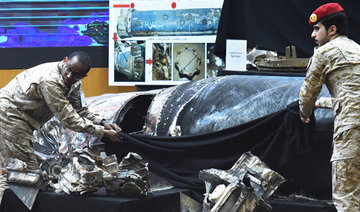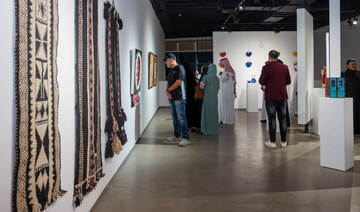RIYADH: The Saudi-led coalition fighting Yemen’s Houthi movement said on Monday that ballistic missile attacks on Saudi Arabia were a serious escalation and threat to regional and international security.
Coalition spokesman Col. Turki Al-Malki told a news conference in Riyadh that Sunday’s missile attacks on the Saudi capital were a clear violation of international law and accused the Houthis of smuggling weapons from Iran.
The coalition threatened retaliation against Tehran, accusing it of being behind the multiple attacks on the Kingdom.
We “reserve the right to respond against Iran at the right time and right place,” coalition spokesman Turki Al-Malki told a news conference, calling the development a “dangerous escalation.”
Saudi forces said they intercepted seven missiles on Sunday, including over the capital Riyadh, in a deadly escalation that coincided with the third anniversary of the coalition’s intervention in Yemen.
Displaying wreckage at a news conference in Riyadh of what it said were fragments of those ballistic missiles, the coalition claimed forensic analysis showed they were supplied to Houthi rebels by their ally Iran.
“The missiles launched against Saudi territory were smuggled from Iran,” coalition spokesman Turki Al-Malki told reporters.
"Iran has become like an appendix in the body of the international community. Either they correct their evil path or the international community will correct it for them," he said.
Al-Maliki added Houthi rebels have fired 104 ballistic missiles towards Saudi Arabia and Iran exploits the Al-Hudaydah Port in Yemen to smuggle ballistic weapons to the Houthis.
He also stated that Houthis are using Sanaa airport as a platform to train their militias and as a base to launch their Iranian-made "Sayyad" ballistic missiles.
Presenting the remnants of alleged Iranian-made missiles, Al-Maliki described the possession of ballistic missiles by Houthi militants as a "serious developmnet".
"Yemen has suffered from Iranian intervention and support for Houthi militants to force a coup," he added.
The missile strikes resulted in the first reported fatality from Houthi fire in the Saudi capital.
Egyptian national Abdul-Moteleb Ahmed, 38, died instantly in his bed when what appeared to be burning shrapnel struck his ramshackle room in Riyadh’s Um Al-Hammam district, leaving a gaping hole in the roof, witnesses said.
Three other Egyptian laborers in the same room were wounded and hospitalized, they said.
The Iran-aligned Houthis said on their Al-Masirah television that Riyadh’s King Khalid International Airport was among the targets.
Al-Maliki alleged the rebels in Sanaa were using the airport there to launch missiles on Saudi territory, adding the coalition had seized a number of smuggled weapons.
Iran has repeatedly denied arming the Houthis in Yemen, despite claims by the United States and Saudi Arabia that the evidence of an arms connection is irrefutable.
Saudi-led coalition threatens retaliation against Iran over missiles
Saudi-led coalition threatens retaliation against Iran over missiles
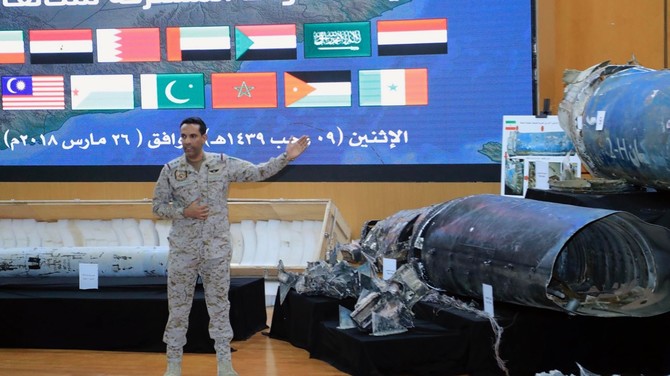
Young Saudi rug makers weave kaleidoscope of dreams

- Bassam Al-Khalifi, Saud Al-Rasheed master the art of tufting rugs
RIYADH: In the wake of the pandemic Bassam Al-Khalifi and Saud Al-Rasheed transformed their isolation into creativity, leading to the birth of Ghazlah Studio — a hub for unique, hand-tufted rugs.
The Saudi men’s story is not just about artistry but a testament to how challenging times can inspire innovation and passion.
Al-Khalifi’s journey began when he sought to decorate his room. Frustrated by the lack of appealing rugs in the market, he decided to create his own.
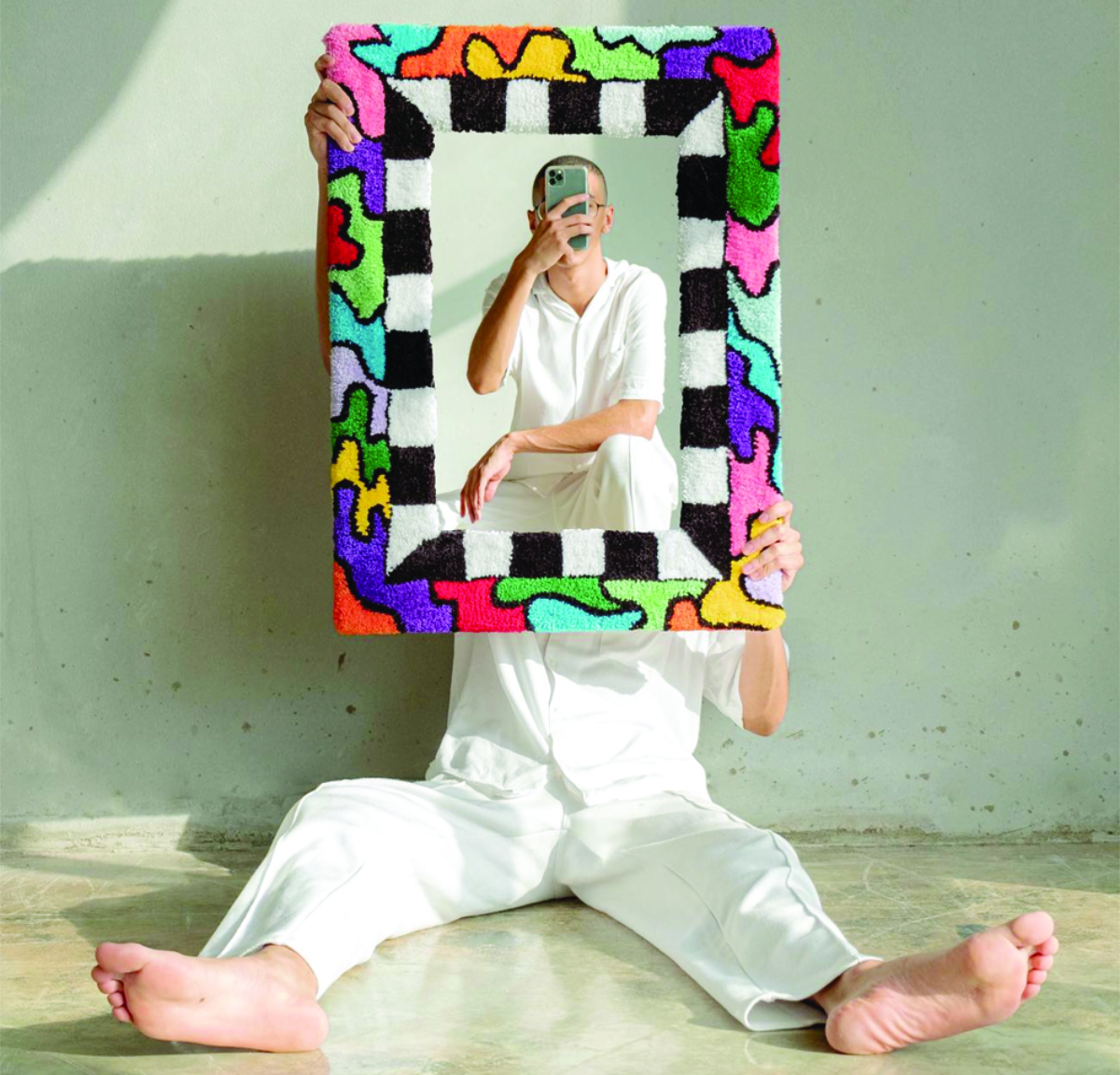
“I wanted something different, so I ordered the equipment and dedicated a year to learning how to tuft,” he told Arab News. What started as a personal project quickly evolved into a larger vision.
Initially, neither Al-Khalifi, an artist and designer, nor Al-Rasheed, an avid art collector, had any experience in weaving. They faced a steep learning curve but were undeterred.
“We took six months to learn how to conceive designs, source materials, and weave the rugs,” Al-Khalifi explained.
HIGHLIGHTS
• The journey of Ghazlah Studio began when Bassam Al-Khalifi, frustrated by the lack of appealing rugs in the market, decided to create his own.
• Their debut collection titled ‘Color as a Scene’ evokes a range of emotions, reflecting the complex sentiments many experienced during the pandemic.
They experimented with various techniques, ultimately settling on a “cut and loop” method using 100 percent acrylic yarn. This approach stands in contrast to traditional Arabian carpet-making methods which often utilize wool and time-honored designs.
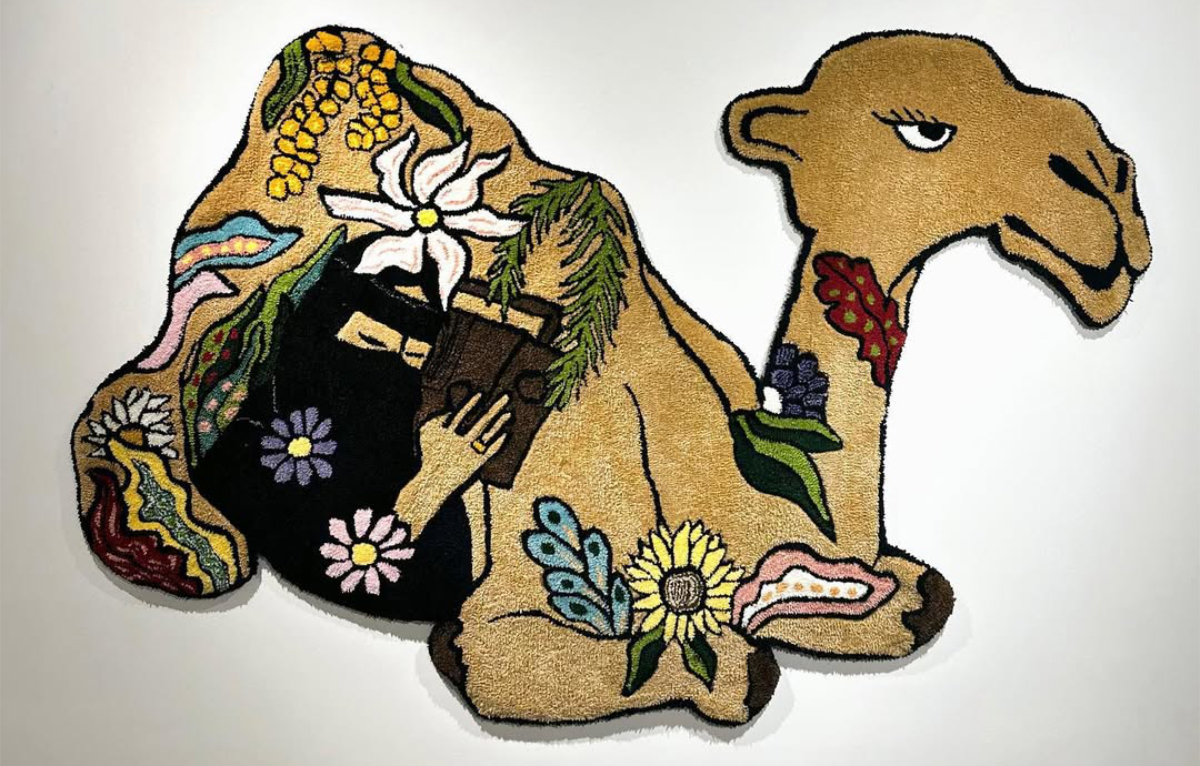
Their learning process was filled with challenges, but their determination pushed them forward.
Al-Khalifi pored over tutorials, consulted with experts, and practiced tirelessly. Al-Rasheed, with his keen eye for aesthetics, contributed by curating color palettes and design concepts.
What started as a hobby soon blossomed into a commercial venture. With their rugs gaining traction, Al-Khalifi and Al-Rasheed launched Ghazlah, featuring a debut collection titled “Color as a Scene.”
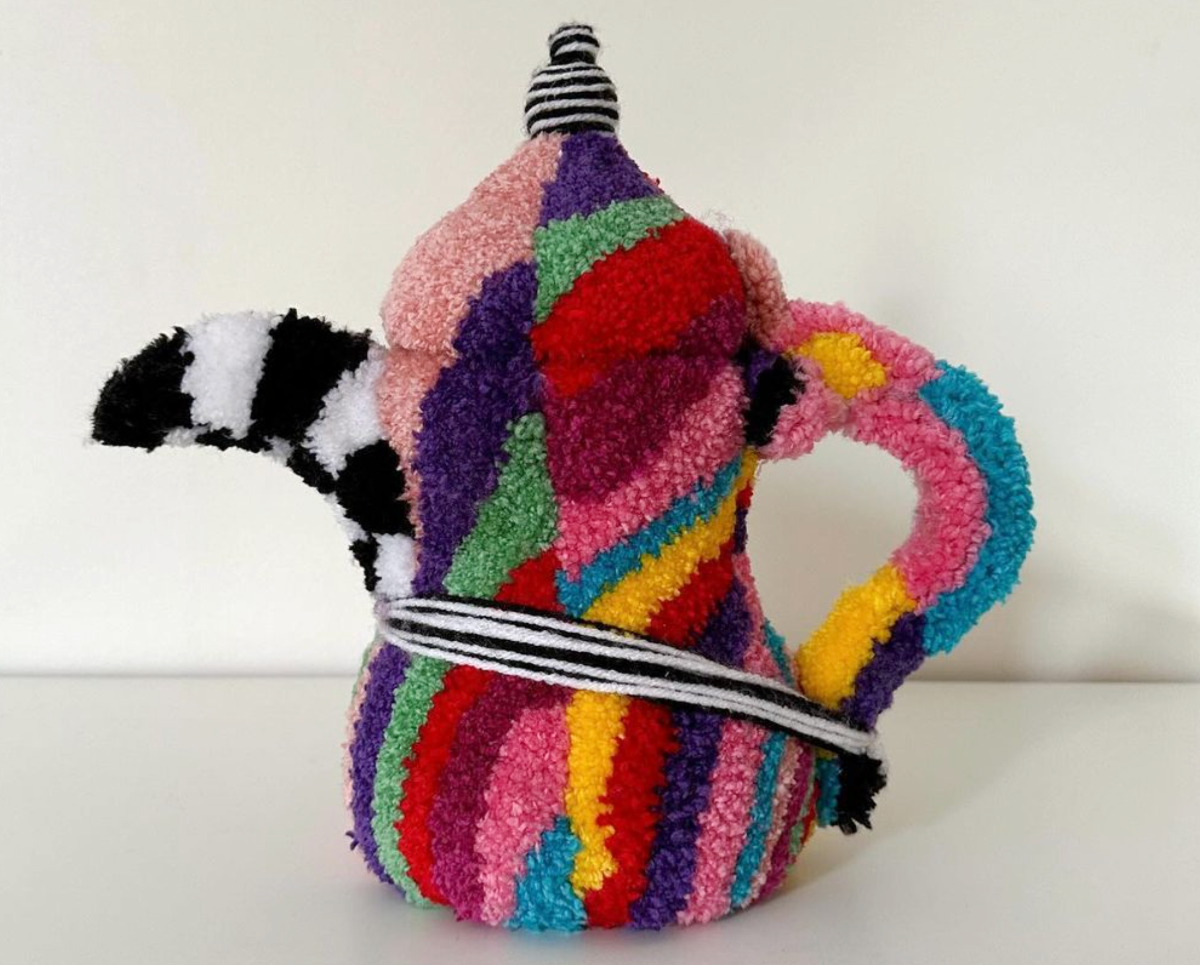
The collection evokes a range of emotions, reflecting the complex sentiments many experienced during the pandemic. “I wanted to splash all these emotions on the piece itself,” Al-Khalifi said. The vibrant tapestries of feelings capture the essence of joy, nostalgia, and hope.
The vibrance of their work makes a statement piece in any room. Each piece is unique, with some featuring Saudi themes that enhance their significance and appeal. The artists also draw inspiration from their heritage, incorporating traditional motifs and modern designs, creating a fusion that resonates with a broad audience.
In Ghazlah’s Riyadh workshop, the atmosphere is filled with creativity and energy. The walls are lined with neatly organized shelves filled with spools of yarn in every imaginable color. There are some of Al-Khalifi’s paintings and rugs still in progress, showcasing their journey.
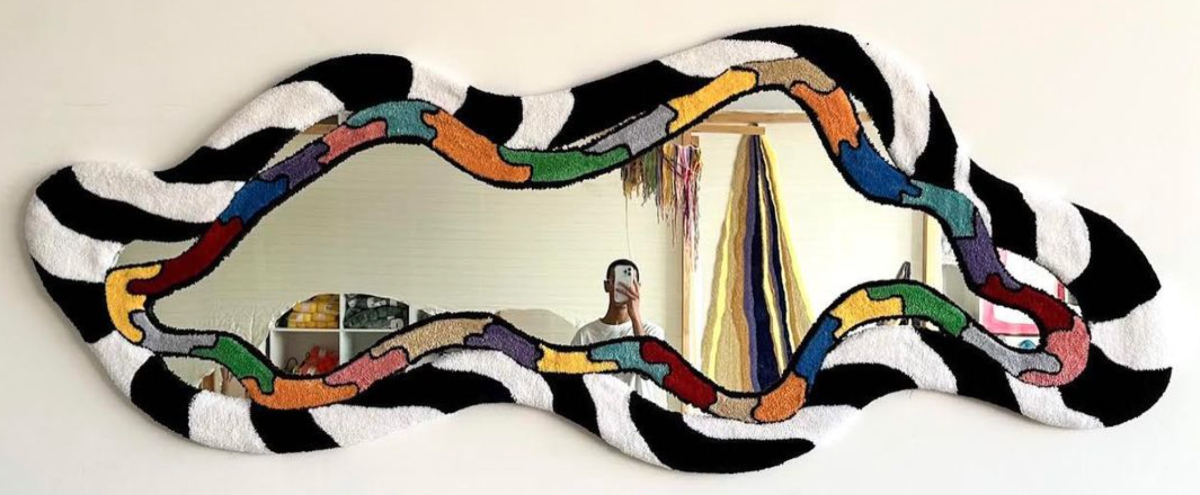
Al-Rasheed gestured around the space, saying: “This place is full of rugs that we made but decided not to sell. Why? Because we love them. I’m trying to push Al-Khalifi to sell them, but he won’t.”
Ghazlah Studio has made a notable impact in Riyadh, showcasing creations in three galleries. Their work has garnered attention not just locally but also from international platforms, leading to collaborations with major brands such as Vogue and Sephora.
These partnerships have elevated their profile and allowed them to reach a wider audience with which they can share their artistry and craftsmanship.
The duo’s success can also be attributed to their innovative marketing strategies. They leverage social media to share their creative process, engage with customers, and build a community around their brand.
By showcasing behind-the-scenes footage, they invite their audience into their world, allowing them to witness the transformation of raw materials into stunning art pieces.
As they continue to grow, Al-Khalifi and Al-Rasheed are committed to exploring new design possibilities, as well as looking into creating home decor items. They plan to expand their collections, experimenting with different textures, materials, and techniques.
From a simple idea born during quarantine to a noteworthy business, Ghazlah Studio continues to make waves in the art scene, proving that even in isolation, inspiration can thrive.
As they weave their stories into every rug, Al-Khalifi and Al-Rasheed invite us all to find beauty and meaning in our own creative pursuits.
Hail governor inaugurates Middle East’s largest salmon production center

- The 10,000-square-meter facility features the latest marine technology
HAIL: Prince Abdulaziz bin Saad bin Abdulaziz, the governor of Hail, inaugurated the Excellence Center for Salmon Production on Saturday, the largest facility of its kind in the Middle East.
A collaboration between the Ministry of Environment, Water, and Agriculture and King Abdulaziz University, the center aims to produce 100,000 tons of salmon annually, bolstering Saudi Arabia’s food security and aquaculture sector, the Saudi Press Agency reported.
The 10,000-square-meter facility features the latest marine technology, including recirculating aquaculture systems and aquaponics units, which integrate fish and vegetable production.
It is designed to reduce the Kingdom’s reliance on salmon imports, currently at 23,000 tons per year.
Prince Abdulaziz hailed the project as a cornerstone of Vision 2030, promoting sustainable development and economic diversification, while attending officials highlighted its potential to enhance innovation, create jobs, and serve as a model for sustainable aquaculture in the region, SPA added.
Islamic minister highlights Saudi Arabia’s role in promoting peace

- European guests praise Saudi Arabia’s hospitality, cultural outreach efforts
JEDDAH: Saudi Arabia’s Ministry of Islamic Affairs hosted a cultural event for the second group of Guests of the Custodian of the Two Holy Mosques’ Program for Umrah and Visit, featuring various cultural and entertainment activities.
The group comprised 250 pilgrims from 14 European countries, the Saudi Press Agency reported.

They expressed their gratitude to the leadership and the ministry for hosting them, allowing them to perform Umrah rituals and visit historic sites in Madinah and Makkah.
Minister of Islamic Affairs Sheikh Abdullatif Al-Asheikh said Saudi Arabia, under the leadership of King Salman and Crown Prince Mohammed bin Salman, was committed to being a beacon of goodness and moderation.
HIGHLIGHT
The minister also highlighted the Kingdom’s commitment to providing humanitarian aid to those in need around the world, in line with Islam’s core values of promoting compassion and support.
During a reception for the guests, he said the Kingdom would continue to serve Islam and Muslims, and promote tolerance, coexistence and understanding worldwide.
Al-Asheikh, who is also the general supervisor of the program, met the guests, conveyed the greetings of the Saudi leadership and along with members of the program’s working committees reviewed the services provided and received a briefing on their work.
Under its leadership, the Kingdom strove to offer top-tier services to the visitors of the Two Holy Mosques from around the world, he said.
The guests commended the Kingdom on its efforts to promote Islam’s message of tolerance and foster appreciation for its historical and spiritual legacy. They also praised the new projects and expansions at the holy mosques and sites, which align with Saudi Vision 2030.
Al-Khamar Al-Baqari, head of imams in the Netherlands, expressed his gratitude to Saudi Arabia, its government and its people for their hospitality.
Sheikh Ali Al-Zughaibi, the program’s executive director, said that since its launch in 2014 it had provided the opportunity for 4,500 men and women from around the world to perform Umrah and visit the Prophet’s Mosque.
Al-Asheikh also highlighted the Kingdom’s unwavering commitment to providing humanitarian aid to those in need around the world, in line with Islam’s core values of promoting compassion and support.
Art, animals take center stage at Riyadh camel festival

- The combination of arts and animals makes the event an appealing option for visitors and supports the economic and cultural growth of the Kingdom
RIYADH: The works of a renowned local sculptor are among the creative highlights of this year’s King Abdulaziz Camel Festival, which celebrates not only ships of the desert but arts and crafts from around the Kingdom.
Abdulrahman Al-Zahem is best known for his depictions of camels and traditional tools. Each of his pieces serves as a symbol of the Kingdom’s heritage and connection to the land, the Saudi Press Agency reported.
FASTFACT
The combination of arts and animals makes the King Abdulaziz Camel Festival an appealing option for visitors and supports the economic and cultural growth of the Kingdom.
As well as creating his own works, Al-Zahem spends much of his time helping to nurture the next generation of artists, including his own daughter.
Besides providing a global hub for all things camel, the festival in Al-Sayahid, northeast of Riyadh, is an important platform for the arts, offering an opportunity for artists to showcase their work to a global audience.
The combination of arts and animals also makes the event an appealing option for visitors and supports the economic and cultural growth of the Kingdom.
The festival ends on Tuesday.
Riyadh’s Souq Al-Awaleen celebrates Saudi traditions

- Souq Al-Awaleen features handicrafts, folk art, and live performances reflecting the Kingdom’s cultural heritage and providing a platform for local artisans to showcase their work and revive traditional crafts
RIYADH: Souq Al-Awaleen, a part of Riyadh Season, offers a “captivating journey through Saudi traditions,” according to a recent Saudi Press Agency report.
The souq, entry to which is free, “blends traditional elements with modern touches, creating a vibrant cultural hub,” the SPA continued.
Souq Al-Awaleen features handicrafts, folk art, and live performances reflecting the Kingdom’s cultural heritage and providing a platform for local artisans to showcase their work and revive traditional crafts. Visitors can also participate in workshops focused on Sadu weaving and pottery.
Sufrat Al-Deira, meanwhile, offers “a taste of authentic Saudi cuisine,” the SPA reported, adding that the “atmosphere evokes a bygone era, with activities like cooking demonstrations and cultural performances enriching the experience.”
Riyadh Season runs until March 2025, and has already been attended by more than 12 million people, according to the SPA.






